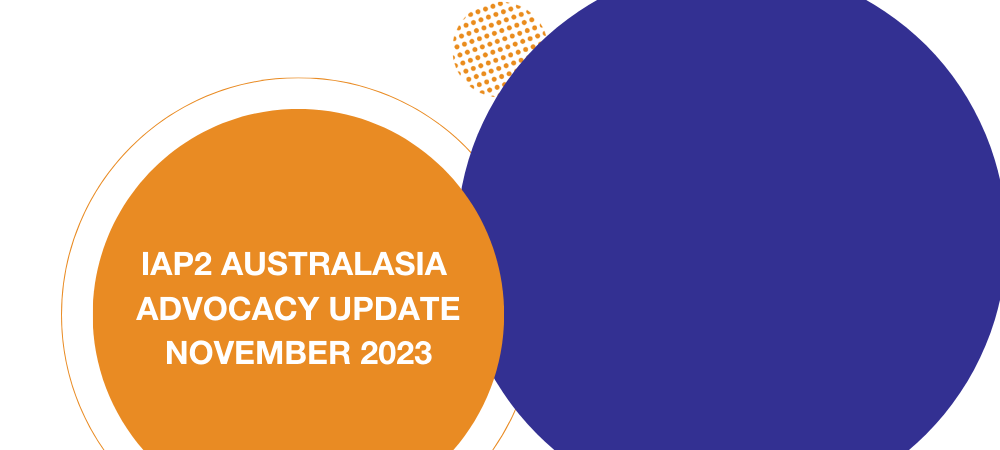IAP2 Australasia Advocacy Initiatives: November Update

ADVOCACY: Be clear what engagement is and see engagement as a strategic opportunity
We have been busy bringing our Advocacy Strategy to life and it has become apparent that there is a real need, and therefore a real opportunity to be clear on what engagement is.
IAP2 defines engagement as “an intentional process with a specific purpose of working across organisations, stakeholders and communities to shape the decisions or actions of members of the community, stakeholders or organisation in relation to a problem, opportunity or outcome”.
You can find the IAP2 definition of engagement on our website and it is included in our Advocacy Recommendations and Calls to Action.
Additionally, IAP2 Australasia is calling for engagement professionals to be included as technical experts on advisory bodies. Community engagement can be a significant project risk, and there are also substantial opportunities in engagement that may go unrealised. Managing community opposition and making substantial changes to projects, particularly at late stages of project planning, can add costs and delay projects. The cumulative effect of this can jeopardise project outcomes.
Engagement expertise is critical to the strategic considerations for project planning. Strategic engagement expertise will identify appropriate opportunities within a broader project plan to enable engagement to enhance a project, not simply pose a risk to be managed.
It has been quite a busy month, with both the annual conference and a number of submissions made (which you can read on our wesite):
- Wrote to Audrey Marsh, Adviser to Minister for Infrastructure, Transport, Regional Development and Local Government, to include engagement as a key requirement in the National Partnership Agreement for major infrastructure projects.
- Submission to the Community Engagement Review being led by Andrew Dyer, Australian Energy Infrastructure Commissioner, Department of Climate Change, Energy, the Environment and Water.
- Submission to the National Urban Policy being led by Mr Matthew Roper, First Assistant Secretary, Department of Infrastructure, Transport, Regional Development, Communication and the Arts.
We continue to reach out and build relationships such as with the Australian Public Service Reform Office, DCCEEW and contribute to the review of various engagement guidelines and charters.
The evidence for engagement is compelling. Community opposition has contributed to the delay, cancellation or mothballing of more than $30B+ of infrastructure projects in the last decade (source: State of Infrastructure and Engagement: Highlights Report 2020-2021, ANU I2S). The 2019 Australian Infrastructure Audit found that better functioning cities and towns could deliver a $29B increase in GDP in the long term, and further the license the operate has been consistently highly rated as a key risk for business.
IAP2 Australasia advocates for engagement to be embedded into policy and regulatory frameworks.
Until next time,
Marion Short, CEO, IAP2 Australasia
